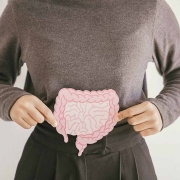Navigating Holiday Meals with Gut Issues: Simple Tips for a Comfortable Season
The holiday season is a time when we gather, share meals, and reconnect with the people we care about. While this time of year brings joy for many, it also carries emotional and historical complexity for others. As we celebrate, it’s important to hold space for those who may find this season challenging whether it be due to personal circumstances, health conditions, or past experiences. A moment of reflection and compassion can go a long way.
For many of us, holiday traditions revolve around food. Family recipes passed down for generations, special treats made only once or twice a year, and shared meals play a meaningful role in the festivities. However, when you’re living with gut issues or a chronic digestive condition, enjoying these foods can feel complicated. You might want to savor the flavors you love, but worry about how you’ll feel afterward.
The good news: you can still enjoy the holidays you just may need to navigate them a bit differently. Here are four helpful strategies to support your gut and your overall well-being this season:
1. Know Your Gut Status
Understanding your triggers is key. Before attending a gathering or preparing your own plate, check in with yourself. Knowing which foods your body tolerates and which ones consistently cause discomfort can help you make mindful choices without feeling deprived. Make sure to have your medications and supplements with you.
2. Respect Your Limitations
If there’s a particular dish you love, but can only handle in small amounts, give yourself permission to enjoy a little of it. Savor it slowly. Part of honoring your health is recognizing your boundaries and choosing not to push past them. Allergies and severe sensitives are exempt. Do not consume anything you are allergic to and/or can cause major bodily discomfort.
3. Put Your Fork Down Between Bites
This is something simple that can help you digest your food and connect with others. Take a bite, chew thoroughly, then set your fork down and enjoy conversation with the people around you. This naturally slows your pace, improves digestion, and gives your body time to signal fullness helping you feel satisfied without overeating.
4. Start Small
Begin with a small plate or small portions of each food. Give yourself about an hour to see how your body responds. If you’re tolerating things well, you can always return for more. Starting with large portions often leads to discomfort, feelings of shame, or feeling physically ill. Starting small gives you control.
Living with gut issues doesn’t mean you have to miss out on the joy of holiday meals. With a bit of awareness, pacing, and self-compassion, you can enjoy both the food and the company without compromising your well-being.
Enjoy and Happy Holidays!
Chardonée
Chardonée Donald is a Board-Certified Nutrition Specialist, Licensed Dietitian Nutritionist and Certified Behavioral Health Specialist. Having completed her degree requirements, Chardonée is in the final portion of her doctorate degree program in Integrative and Functional Nutrition from Saybrook University. She has a Bachelor of Science in Biomedical Science with a Minor in Nutrition and a Master of Science in Human Nutrition.
We are here for you, and we want to help.
Our goal is to return you to optimal health as soon as possible. To schedule an appointment please call: 703-532-4892 x2







